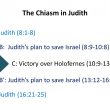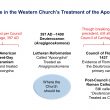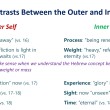Introduction Though Tobit includes historical reality in its background setting, it is not history but a religious novel to teach the faithful. Like Judith, this book contains information known not to be true, drawing the hearer to focus on the religious content, not the historical facts. For example, the sequence of Assyrian kings is incomplete […]
The Apocrypha, Lesson 7: Judith, Pt. 2
Recap Last week, we learned Judith “put sandals on her feet, and put on her anklets, bracelets, rings, earrings, and all her other ornaments, and made herself very beautiful, to entice the eyes of all men who might see her.” So, Judith and a servant make their way to the Assyrian camp. Judith Goes […]
The Apocrypha, Lesson 6: Judith, Pt. 1
Introduction Judith is work of religious fiction without the pretense of recounting actual history. The story opens with a fictionalized Nebuchadnezzar making war on an invented King of the Medes, Arphaxad. The first hearers of Judith would catch this, clueing them in to understand Judith for its religious value. The real Nebuchadnezzar was king of […]
The Apocrypha, Lesson 4: The Greek Portions of Daniel, Pt. 2
Last week, we looked at the Prayer of Azariah and the Hymn of the Three Young Men, which are placed between Daniel 3:23 and 3:24. Today, we study the story of Susanna, which becomes Daniel, chapter 13. Susanna Susanna is the story of a woman, whom two “dirty old men” accused of committing adultery. […]
The Apocrypha, Lesson 3: The Greek Portions of Daniel, Pt. 1
The Protestant edition of Daniel is written in Hebrew (1:1-2:3, 8:1-12:13) and Aramaic (2:4-7:28). The Daniel of the Septuagint is all Greek, with some portions not being a translation but with an original Greek text. These include a couple of liturgical pieces: The Prayer of Azariah and the Hymn of the Three Young Men, which […]
The Apocrypha, Lesson 2: How We Lost the Apocrypha
Last week, we learned what the Scriptures were for Jesus and his Apostles: The Septuagint, the Greek-language version of the Old Testament. Jesus also affirmed this in His Scripture quotes, which favored the Septuagint and when He told the Sadducees they didn’t know the Scripture, referring to the book of Tobit (Matthew 22:29). In 397 […]
The Lutheran Church and Purgatory, Pt. 1
This is our pastor’s newsletter article for the June 2016 issue of our congregational newsletter. Last month, we looked the body’s resurrection and the intermediate state of our souls being in heaven until Jesus calls forth our bodies on the Last Day. The Roman-Catholic Church also believes in an intermediate state of existence for heaven-bound […]
1 Maccabees 4:36-51, John 10:22-33
Today, we are following Jesus. We walk behind Him, and He makes His way to the Temple to celebrate a festival. For us, it is spring; for Jesus, the season is now winter. So, Jesus chooses to make His way to the Temple to celebrate a religious festival God never commanded for His people. Why […]
The Books of the Old Testament: The Apocrypha
This article is a supplement to the church bulletin for our Palm Sunday service. The Old Testament reading is from 2 Maccabees 10:1-7, which gives us a better context for understanding the people’s response as Jesus rode into Jerusalem. The text from 2 Maccabees reads: With the Lord leading them, Maccabeus and his followers restored […]
2 Corinthians, Lesson 7: The Resurrection Encourages Us, even in Our Suffering
Paul and Timothy said that what was happening to them, their suffering and being brought closer to death, made them outwardly seem fragile, like jars of clay. People considered such earthen containers of little value because they held garbage or excrement. Although Paul and Timothy looked like they were of little value, what they brought […]




